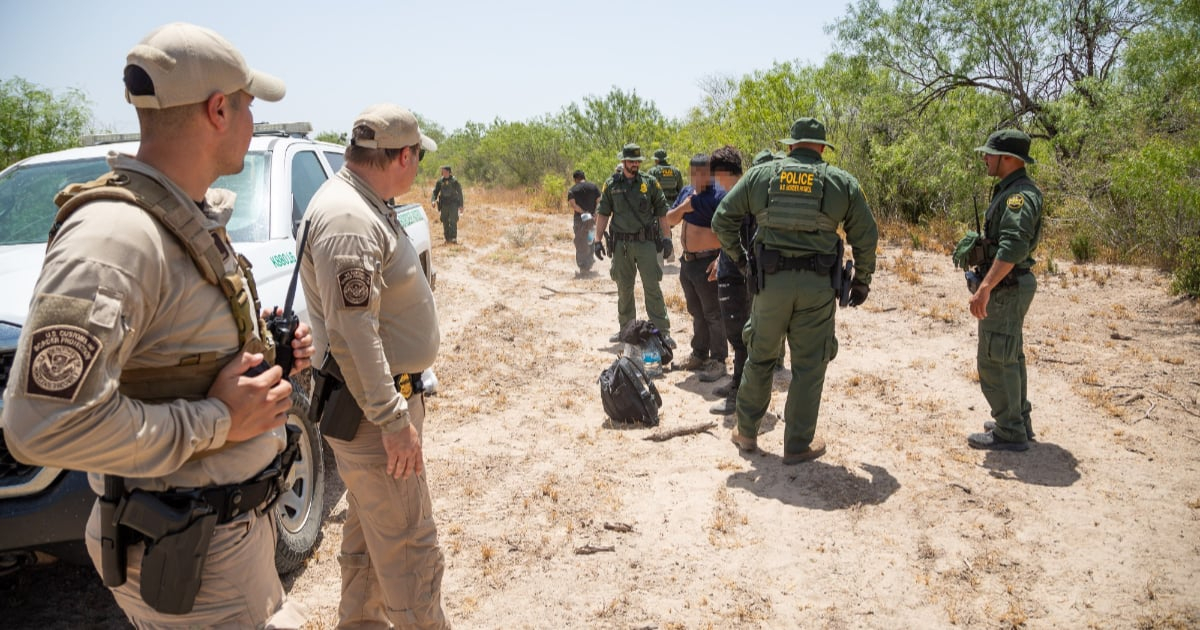The executive order signed on Tuesday by President Joe Biden brings significant changes to border operations that directly impact Cuban migrants. The measure drastically restricts asylum applications at the U.S.-Mexico border and allows U.S. authorities to deport those who do not meet strict asylum standards. Additionally, it permits the closure of the border when the number of daily detentions exceeds 2,500 over a seven-day average.
Key Changes Under Biden's New Order
1. The primary action is to prohibit migrants who cross the southern border illegally from receiving asylum, unless they arrive with a CBP One appointment (which offers 1,450 appointments daily). In such cases, the asylum option will be available. This proclamation, under sections 212(f) and 215(a) of the Immigration and Nationality Act, suspends the entry of non-citizens who cross illegally and is accompanied by an interim final rule from the Departments of Justice and Homeland Security restricting asylum for these non-citizens. The rule will be in effect when the southern border is overwhelmed, making it easier for immigration officials to quickly expel individuals without a legal basis to remain in the United States.
2. The border will close immediately when the number of encounters surpasses 2,500 daily, meaning this measure could take effect right away as current daily figures exceed this number.
3. Asylum protocols will relax once the daily encounter average drops to 1,500 over 14 days, a challenging target since the last time the average fell to 1,500 was in July 2020, during the height of the pandemic.
4. Migrants who arrive and seek asylum must demonstrate a "reasonable possibility" of facing torture or persecution if returned to their home country, in adherence to the United Nations Convention against Torture, which prohibits expelling someone to a country where they may face torture.
5. Migrants unable to prove they qualify for asylum under this elevated standard will undergo deportation within hours or days. The situation varies depending on the migrant's nationality: Mexicans or nationals from Cuba, Haiti, Nicaragua, and Venezuela will be returned directly to Mexico under prior U.S. agreements with Mexican authorities. Migrants from other regions, such as Colombia or Ecuador, or countries outside Latin America, will face deportation flights.
6. Exceptions are made for unaccompanied minors traveling north, victims of human trafficking, and those with acute medical emergencies or extreme threats to their life and safety.
7. These measures are not permanent. Asylum protocols will once again relax once the daily encounter average drops to 1,500 over 14 days, though this remains a challenging benchmark.
Other Recent Actions to Secure the U.S. Border
1. The Department of Homeland Security issued a rule to ensure that migrants who pose a public or national security risk are expelled swiftly, rather than remaining in costly, prolonged detention before removal.
2. To expedite immigration cases, the Department of Justice and the Department of Homeland Security launched a docket for recent arrivals to quickly resolve cases of migrants attempting to cross between ports of entry at the southern border, in violation of the law.
3. The Department of State imposed visa restrictions on executives of various Colombian transportation companies profiting from maritime migrant trafficking. This action targets companies facilitating illegal entry into the United States. Visa restrictions were also placed on over 250 members of the Nicaraguan government, non-governmental actors, and their immediate families for supporting the Ortega-Murillo regime, which is selling transit visas to migrants. Additionally, visas were revoked for executives of charter airlines involved in similar activities.
4. Expanded efforts to dismantle human trafficking and support immigration processes. The Departments of State and Justice launched a "Rewards for Justice" initiative targeting human trafficking leadership in Central America and the U.S. southern border, offering financial rewards for information leading to the identification, location, arrest, or conviction of key traffickers. The Department of Justice will seek harsher penalties for traffickers and will partner with the Department of Homeland Security to deploy additional prosecutors and support staff to increase immigration-related prosecutions in critical border districts.
Despite these measures, President Biden emphasized that he will not "demonize" migrants and asked Americans for patience and trust in his handling of immigration issues, especially with the upcoming November elections. "I will not separate children from their families," the president promised.
FAQs on U.S. Asylum Policy Changes
Here are some frequently asked questions to help clarify the recent changes in U.S. asylum policies under President Joe Biden's executive order.
How will the new asylum policy impact Cuban migrants?
Cuban migrants, along with those from Haiti, Nicaragua, and Venezuela, who do not meet the new asylum standards will be returned directly to Mexico under existing agreements with the Mexican authorities.
What is the CBP One appointment system?
CBP One is an appointment system that offers 1,450 daily appointments for migrants seeking asylum. Those who secure an appointment through CBP One will have the option to apply for asylum.
What are the exceptions to the new asylum rules?
Exceptions include unaccompanied minors, victims of human trafficking, and individuals with acute medical emergencies or extreme threats to their life and safety.
When will the asylum protocols relax again?
The asylum protocols will relax once the daily encounter average drops to 1,500 over a 14-day period. However, achieving this target could be difficult.
